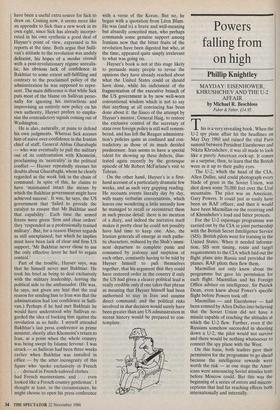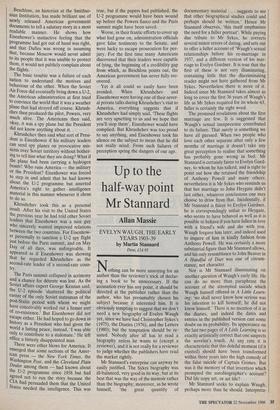Powers falling from on high
Phillip Knightley
MAYDAY: EISENHOWER, KHRUSHCHEV AND THE U-2 AFFAIR by Michael R. Beschloss
Faber & Faber, f14.95
This is a very revealing book. When the U-2 spy plane affair hit the headlines on May Day 1960 and ruined the vital Paris summit between President Eisenhower and Nikita Khrushchev, it was all made to look like a purely American cock-up. It comes as a surprise, then, to learn that the British were in it up to their guilty eyes.
The U-2, which the head of the CIA, Allen Dulles, said could photograph every blade of grass in the Soviet Union, was shot down some 70,000 feet over the Ural mountains. The pilot was an American, Gary Powers. It could just as easily have been an RAF officer, and then it would have been Macmillan on the receiving end of Khrushchev's loud and bitter protests.
For the U-2 espionage programme was carried out by the CIA in joint partnership with the British Secret Intelligence Service (SIS). British pilots went for training in the United States. When it needed informa- tion, SIS sent timing, route and target requirements to the CIA which laid out the flight plans into Russia and provided the planes. RAF pilots then flew them.
Macmillan not only knew about the programme but gave his permission for each flight. Macmillan and his Foreign Office adviser on intelligence, Sir Patrick Dean, even knew about Power's specific flight before Powers took off.
Macmillan — and Eisenhower — had been conned by Allen Dulles into believing that the Soviet Union did not have a missile capable of reaching the altitudes at which the U-2 flew. Further, even if the Russians somehow succeeded in shooting down a U-2, the pilot would not survive and there would be nothing whatsoever to connect the spy plane with the West.
On this basis, both leaders gave their permission for the programme to go ahead because the intelligence rewards were worth the risk — at one stage the Amer- icans were announcing Soviet missiles tests before Moscow could. But this was the beginning of a series of errors and miscon- ceptions that had far reaching effects both internationally and internally. Beschloss, an historian at the Smithso- nian Institution, has made brilliant use of newly released American government documents to tell a salutary story in a most readable manner. He shows how Eisenhower's instinctive feeling that the programme had got out of hand was right, and that Dulles was wrong in assuming that, because Moscow would never admit to its people that it was unable to protect them, it would not publicly complain about the flights.
The basic trouble was a failure of each nation to understand the motives and behaviour of the other. When the Soviet Air Force did eventually bring down a U-2, the American administration at first tried to convince the world that it was a weather plane that had strayed off course. Khrush- chev then produced the pilot, Powers, very much alive. The Americans then said, okay, it was a spy plane but the President did not know anything about it. Khrushchev then said what sort of Presi- dent is Eisenhower if his military leaders can send spy planes on provocative mis- sions over Soviet territory without bother- ing to tell him what they are doing? What if the plane had been carrying a hydrogen bomb? Who runs America — the military or the President? Eisenhower was forced to step in and admit that he had known about the U-2 programme but asserted America's right to gather intelligence material in this manner whenever it chose to do so.
Khrushchev took this as a personal insult. After his visit to the United States the previous year he had told other Soviet leaders that Eisenhower was a nice guy who sincerely wanted improved relations between the two countries. For Eisenhow- er personally to sanction a U-2 spy flight just before the Paris summit, and on May Day of all days, was unforgivable. It appeared as if Eisenhower was showing that he regarded Khrushchev as the second-rate leader of a second-rate coun- try.
The Paris summit collapsed in acrimony and a chance for détente was lost. As the Soviet affairs expert George Kennan said, the U-2 episode 'shattered the political career of the only Soviet statesman of the post-Stalin period with whom we might have conceivably worked out a firmer sort of co-existence.' But Eisenhower did not escape either. He had hoped to go down in history as a President who had given the world a lasting peace, instead, 'I was able only to contribute to a stalemate.' He left office a bitterly disappointed man. There were other blows for America. It emerged that some sections of the Amer- ican press — the New York Times, the Washington Post, and the Cleveland Plain Dealer among them — had known about the U-2 programme since 1958 but had agreed not to run the story because the CIA had persuaded them that the United States needed the intelligence. This was true, but if the papers had published, the U-2 programme would have been wound up before the Powers fiasco and the Paris summit might have been saved.
Worse, in their frantic efforts to cover up what had gone on, administration officials gave false testimony to the Senate, and were lucky to escape prosecution for per- jury. For the first time many Americans discovered that their leaders were capable of lying, the beginning of a credibility gap from which, as Beschloss points out, the American government has never fully rec- overed.
Yet it all could so easily have been avoided. When Khrushchev and Eisenhower were having one of their sever- al private talks during Khrushchev's visit to America, everything suggests that if Khrushchev had simply said, 'These flights are very upsetting to us and we hope that you'll stop them', Eisenhower would have complied. But Khrushchev was too proud to say anything, and Eisenhower took his silence on the subject to mean that he did not really mind. From such failures of perception spring the dangers of our age.



























































 Previous page
Previous page